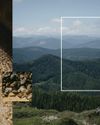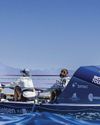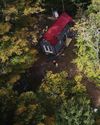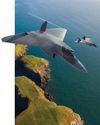
BRAD BLOIS CAN VIVIDLY RECALL THE FIRST time he fought a wildfire from the air. He remembers the thick stench of smoke, the sound of chatter crackling through his radio, the physical vibrations of the other tankers nearby-a total sensory overload. "It was like drinking from a firehose," he says.
But he knew he'd made the right decision.
It was the spring of 2014, and a fire-likely ignited by sparks flung from railroad tracks-was tearing through a forest in Alberta, Canada. Blois had never worked as an aerial firefighter before.
Typically, on top of their training, new hires will fly as a copilot for their first few flights. Because Blois had significant flight experience, he started off as a captain immediately.
Blois, 49, began flying professionally in 1999. He spent the early years of his career picking up whatever seasonal flying opportunities came his way. First, he worked as a minnow trapper, which entailed flying a little Piper PA-8 Super Cub float plane-a "flying aquarium"-to small lakes dotted across northern Ontario, collecting bait fish that had been caught in traps overnight. He then became a pilot for commercial seaplane operators that primarily served sport-fishing lodges and Indigenous communities in the remote north. Later, he booked gigs flying to and from the Arctic and the Antarctic.
He first took up aerial firefighting a decade ago on the suggestion of his best friend, a fellow pilot named William Hilts. "It's the most fun you can have with your clothes on," Hilts had told him.
Pilot Brad Blois first began training as aerial firefighter in 2014.
Denne historien er fra July - August 2024-utgaven av Popular Mechanics US.
Start din 7-dagers gratis prøveperiode på Magzter GOLD for å få tilgang til tusenvis av utvalgte premiumhistorier og 9000+ magasiner og aviser.
Allerede abonnent ? Logg på
Denne historien er fra July - August 2024-utgaven av Popular Mechanics US.
Start din 7-dagers gratis prøveperiode på Magzter GOLD for å få tilgang til tusenvis av utvalgte premiumhistorier og 9000+ magasiner og aviser.
Allerede abonnent? Logg på

ONE OF THE 'GREATEST THREATS' TO THE PACIFIC NORTHWEST ISN'T WHAT YOU THINK.
EXPERTS ARE PREPARING THE REGION AGAINST THE THREAT OF DANGEROUS VOLCANIC MUDFLOWS, KNOWN AS LAHARS, WHICH COULD INUNDATE THE COMMUNITIES SURROUNDING MT. RAINIER IN AS LITTLE AS 30 MINUTES.

THE WORLD'S TOUGHEST ROW
They rowed 3,000 miles across the Atlantic, battling unpredictable weather, chaotic seas, and finicky equipment. But what they discovered gave them profound new insights into the power of the ocean.

HOW TO DIY OFF-GRID SOLAR
SPEND THE TIME UP FRONT AND PLAN IT CAREFULLY TO AVOID DISAPPOINTMENT

Are We on the Verge of an ARMS RACE in SPACE?
RUMORS OF A RUSSIAN SPACE NUKE, ALONG WITH OTHER SATELLITE-TARGETING WEAPONS, HAVE MADE GEOPOLITICAL TENSIONS EXTEND INTO ORBIT.

Fresh Fingerprints on an Ancient Statue
A CLAY FIGURINE HAS SPENT MILLENNIA incomplete, waiting at the bottom of a lake for its long-dead craftsman to finish the Iron Age-era statuette.

Quantum Entanglement in Our Brains
IT HAS LONG BEEN ARGUED THAT THE human brain is similar to a computer. But in reality, that's selling the brain pretty short.

The Tools of Copernicus
WAY BACK IN 1508, WITH ONLY LIMited tools at his disposal, Nicolaus Copernicus developed a celestial model of a heliocentric planetary system, which he described in hist landmark work De revolutionibus orbium coelestium. It was a complete overhaul of our conception of the universe-one that, unfortunately, earned him the ire of the Catholic church for decades after his death-and forever changed the way we look at the stars.

Building a Sixth-Generation Bomber Raptor
THE GLOBAL COMBAT AIR Programme (GCAP)-a project by the U.K., Italy, and Japan to develop a sixth-generation stealth fighter-has been busy at the drawing board reshaping its vision of the future of air warfare. And judging by the new concept model unveiled at this year's Farnborough air show, that future has big triangular wings.

The Electroweak Force of the Early Universe
TODAY, THE UNIVERSE AS WE KNOW IT IS governed by four fundamental forces: the strong nuclear force, the weak nuclear force, electromagnetism, and gravity.

This Ancient Fossil With a Brain and Guts
WE KNOW WHAT FOSSILS LOOK like. For example, typical dinosaur fossils are bones turned to stone and preserved from the passage of time, located, if we're particularly lucky, in large collections that can be reassembled to represent the beast they used to prop up in their entirety.